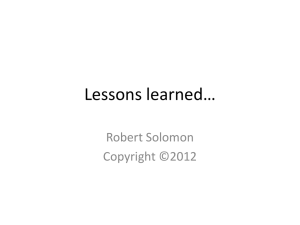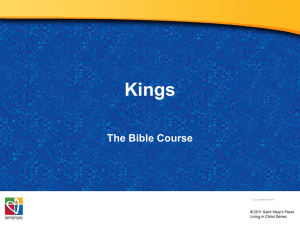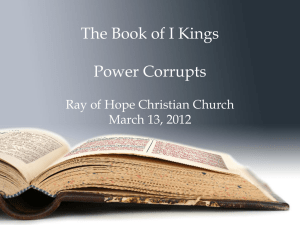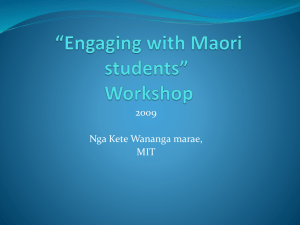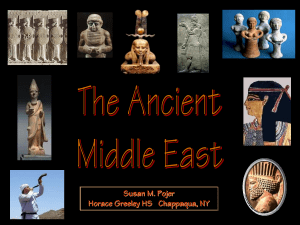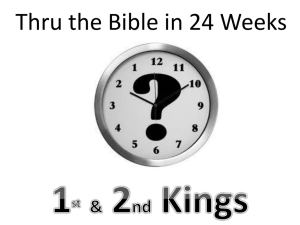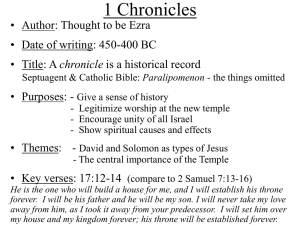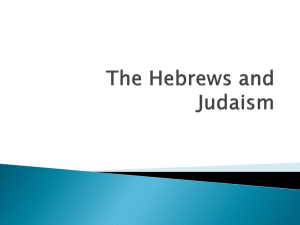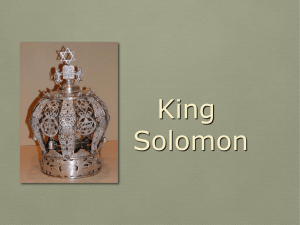The Wisdom of King Solomon
advertisement
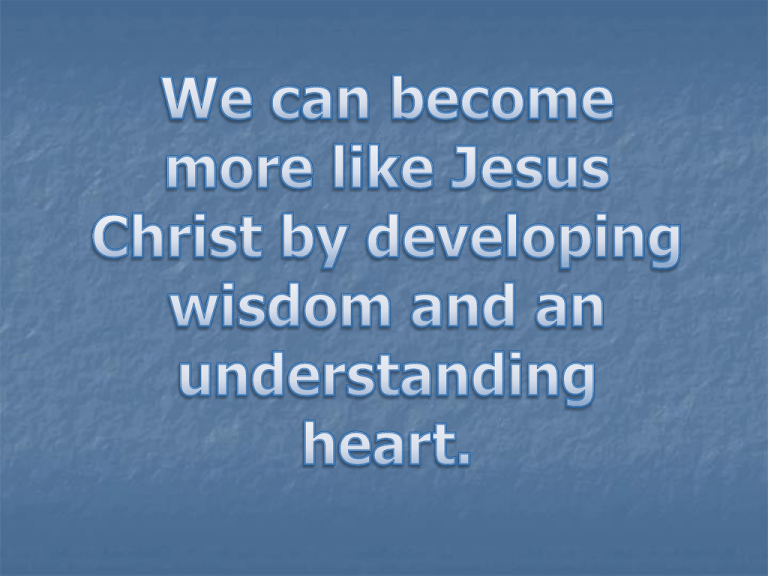
The Wisdom of King Solomon “Lesson 31: The Wisdom of King Solomon,” Primary 6: Old Testament, (1996),135 Name things you would ask for if you could ask Heavenly Father for anything and he would give it to you. I will write your ideas on the board. The coins I am putting in the container represent worldly goods. Some people go through life spending a lot of time and effort on accumulating material goods. Now I am going to add some water to the container. The water represents good deeds or spiritual gifts we can develop. We can help a family member or friend, gain a testimony, be honest, or have an understanding heart. Now I am going to pour the contents of the container through a strainer into another container. The first container represents life, the strainer represents death, and the second container represents life after death. We cannot take material goods with us when we die. We take with us the spiritual gifts we have developed and the good deeds we have done. Which of the items on the board represent things that could last forever? Would you like to change anything you named before? In today’s lesson, we are going to learn about someone who was able to ask God for one thing. He chose an eternal, spiritual gift instead of a temporary, earthly one. The Wisdom of King Solomon David was king for a long time. When he became old he wanted his son Solomon to be the next king. David asked Nathan, the prophet, to anoint Solomon to be king. David told Solomon to obey God’s commandments. When David died Solomon became the king of Israel. He loved God. He asked God to help him be a good king. God was happy Solomon wanted to be righteous. God wanted to bless Solomon. God asked Solomon what blessing he would like. Solomon wanted to be wise. God was glad Solomon chose to be wise. He told Solomon to obey his commandments. Then Solomon would be wise. Solomon became the wisest man on earth. People came from other lands to ask him questions. He gave them wise answers. Kings and queens came to see him. They brought him beautiful gifts. The Israelites came to King Solomon when they needed help. One day two women came to him with a baby boy. The women said they lived in the same house. They each had a baby boy, but one of the babies died. Each mother said the living baby was hers. They wanted King Solomon to tell them who could keep the baby. Solomon wanted to find out which woman was the baby’s real mother. He had a wise plan. Solomon wanted to see what the women would do. He asked for a sword. He told a servant to cut the baby in half. He told the women they would each have half of the baby. Solomon would not really let the baby be cut in half. He knew the baby’s mother would not let her son be hurt. One mother told Solomon not to cut the baby in half. She did not want the baby to be hurt. She loved the baby. She said the other woman could have him. The other woman told Solomon to cut the baby in half. Then Solomon knew who should keep the baby. The real mother did not want the baby to be hurt. Solomon gave the baby to her. Soon all the Israelites heard what had happened. They knew God had made Solomon wise. There was peace in the land of Israel. God said King Solomon should build a temple in Jerusalem. It would be the house of God. Thousands of people helped build the temple. It was made of stone and wood. Men brought the best wood from far away. They cut large stones for the walls of the temple. The temple was beautiful and had rooms with walls and floors covered in gold. There was a golden altar in one room. Another room had a baptismal font on the backs of twelve oxen. The oxen were made of brass. It took seven years to build the temple. At last it was finished. The priests brought the ark of the covenant from the tabernacle. They put the ark in the temple. The two stones the Lord had written the commandments on were in the ark. The priests of Israel came to the temple. They sang songs and thanked God for the temple. The cloud that had been over the tabernacle filled the temple. The temple was the house of God. Solomon spoke to the Israelites. He told them to obey God’s commandments. Then Solomon prayed to God. He asked God to forgive the people when they had repented. Solomon made sacrifices to God. Fire from heaven came down to the altar. The fire burned the sacrifices. The people worshiped God. They thanked him for the temple. God spoke to Solomon. He said if Solomon and the Israelites were righteous he would bless them forever. Solomon was the king of Israel for a long time. He obeyed God for many years. Solomon had many wives. Some of his wives did not believe in God. They worshiped idols. When Solomon was old, he forgot God. His wives wanted him to worship their idols. Solomon did the wrong thing. He made sacrifices to the idols. God was angry at him. God said Solomon’s kingdom would be divided after he died. What advice did David give to his son Solomon? Let’s read 1 Kings 2:1–3 How can we apply this same advice in our lives? Why do you think Solomon referred to himself as “a little child”? Let’s read 1 Kings 3:7 He felt inadequate in his calling to rule and judge his people. What did Solomon do because he felt inadequate? Let’s read 1 Kings 3:3–9 He prepared himself to receive spiritual gifts. What should we do if we are facing a difficult or overwhelming task and we are unsure of our abilities? How can we become worthy to receive spiritual gifts? Knowledge - learning gained through study or experience Wisdom - using what we have learned in the best way to make right choices An Understanding Heart - enables us to know how others feel Enrichment Activity #1 What are some situations where you might ask Heavenly Father to bless you with knowledge, wisdom, or an understanding heart? You can receive these gifts if you seek them and live a worthy life. How can we develop these gifts? Through study, service, prayer, and following the promptings of the Holy Ghost. Enrichment Activity #1 Let’s look at the ideas we listed on the board earlier for spiritual gifts and figure out how develop and use them. Let’s look at the worldly gifts and put some spiritual gifts in their place of the worldly. How can we develop and use them? Enrichment Activity #2 Who appeared to Solomon in a dream? Let’s read 1 Kings 3:5 What was Solomon told to do? What did Solomon ask for? Let’s read 1 Kings 3:9 & 2 Chronicles 1:10 Why were wisdom and an understanding heart so important to Solomon? Why should they be important to us? How did the Lord feel about Solomon’s request? Let’s read 1 Kings 3:10 God was pleased with Solomon when he asked for spiritual gifts instead of riches or selfish desires. What did the Lord give Solomon in addition to what Solomon asked for? Let’s read 1 Kings 3:11–14 What was King Solomon known for throughout his own country and other nations? Let’s read 1 Kings 4:29–30, 34 Why was this more important than being known for his wealth and power? What Christlike quality would you like to be known for among your family and friends? What can you do to develop this quality? Because Solomon, through his wisdom and understanding, was able to judge righteously, the people brought their problems to him. In one such case, why did both women claim to be the mother of the living child? Let’s read 1 Kings 3:16–22 How did Solomon’s wisdom help him discover the real mother? Let’s read 1 Kings 3:24–27 Solomon’s understanding helped him know how the baby’s mother was feeling. How does it make others feel when you are kind and understanding toward them? How have you helped someone by being kind and understanding? How has someone helped you this way? What do you think it means to have “largeness of heart”? Let’s read 1 Kings 4:29 To show love for everyone and to be kind and generous to others. How can we have “largeness of heart” in our families? with our friends? What did Solomon accomplish because the Lord blessed him with wisdom and understanding? Let’s read 1 Kings 3:27–28; chapter headings to 1 Kings 5–8 Solomon did much good during his reign as king. He received permission from the Lord to build a temple in Jerusalem. He built it with the finest materials that had been collected by his father, David, for that purpose. David, Solomon’s father, had wanted to build a temple but was denied the privilege. The Lord instead chose Solomon to direct the seven years of construction. Enrichment Activity #3 When the elaborate temple was finished, the priests carried in the ark of the covenant. The ark contained the two tablets of stone the Lord gave Moses, “to the most holy place” of the building. Let’s read 1 Kings 8:6 Enrichment Activity #3 The glory of the Lord filled the temple. Let’s read 1 Kings 8:10–11 Solomon offered the dedicatory prayer. Let’s read 1 Kings 8:22–53 Enrichment Activity #3 Each temple today has a baptismal font resting on twelve oxen, similar to that in Solomon’s temple. In Solomon’s day this font was used to baptize the living; in our temples today the fonts are used to perform baptisms for the dead. Enrichment Activity #3 Solomon also shared his wisdom with others. Many of his wise sayings were recorded in the book of Proverbs in the Bible. Find the book of Proverbs in your Bible. Most of these proverbs (wise sayings) were written by Solomon, and because of his great wisdom, these sayings can help us today. Enrichment Activity #4 In this container are papers with passages from Proverbs. Take turns choosing a paper from the container. Read the proverb and put it in your own words. How does it apply to you? Enrichment Activity #4 Solomon’s Proverbs a. “Hear the instruction of thy father, and forsake not the law of thy mother” (Proverbs 1:8). b. “If sinners entice thee, consent thou not” (Proverbs 1:10). c. “Trust in the Lord with all thine heart; and lean not unto thine own understanding. In all thy ways acknowledge him, and he shall direct thy paths” (Proverbs 3:5–6). d. “Happy is the man that findeth wisdom, and the man that getteth understanding” (Proverbs 3:13). e. “Lying lips are abomination to the Lord: but they that deal truly are his delight” (Proverbs 12:22). f. “A soft answer turneth away wrath” (Proverbs 15:1). g. “A merry heart maketh a cheerful countenance” (Proverbs 15:13). h. “The Lord is far from the wicked: but he heareth the prayer of the righteous” (Proverbs 15:29). i. “How much better is it to get wisdom than gold!” (Proverbs 16:16). j. “Pride goeth before destruction, and an haughty spirit before a fall” (Proverbs 16:18). k. “Pleasant words are as an honeycomb, sweet to the soul, and health to the bones” (Proverbs 16:24). l. “He that is slow to anger is better than the mighty” (Proverbs 16:32). m. “A friend loveth at all times” (Proverbs 17:17). n. “A merry heart doeth good like a medicine” (Proverbs 17:22). o. “Wine is a mocker, strong drink is raging: and whosoever is deceived thereby is not wise” (Proverbs 20:1). p. “Even a child is known by his doings, whether his work be pure, and whether it be right” (Proverbs 20:11). q. “As he thinketh in his heart, so is he” (Proverbs 23:7). r. “Say not, I will do so to him as he hath done to me” (Proverbs 24:29). s. “A faithful man shall abound with blessings” (Proverbs 28:20). t. “Whoso putteth his trust in the Lord shall be safe” (Proverbs 29:25). Choose one of the proverbs to memorize and share with your family. Enrichment Activity #4 Despite Solomon’s accomplishments, he eventually turned away from God. He used his riches and wisdom for his own glory. He also married women outside of the covenant. These women worshiped idols and persuaded Solomon to worship idols also. When God gives us a gift, we should use it to glorify him and serve others. It is extremely important to use these gifts properly throughout our lives, not just when we are young. As I have loved you, Love one another. This new commandment: Love one another. By this shall men know Ye are my disciples, If ye have love One to another. Words: Luacine Clark Fox, 1914–2002 Music: Luacine Clark Fox, 1914–2002; arr. by Jo Marie Borgeson Bray, 1925–1998 © 1961 by Luacine C. Fox. Copyright renewed 1989. Enrichment Activity #5 I testify that as you develop the ability to be wise and to have an understanding heart toward your family and friends, you will become more like the Savior. Images and clipart are from lds.org, sugardoodle.net, Microsoft Office, and other websites indicating the images were in the public domain. The hymns, scripture story and lesson are primarily from www.lds.org. Please do not use this presentation for commercial use. Feel free to alter the presentation for use in church or home to suit personal preference. The presentation is intended to supplement, not replace, the lesson manual or scriptures. Teachers should refer to the manual, scriptures and other resources when preparing and conducting the lesson.
